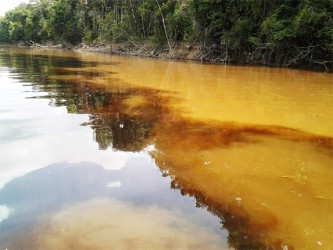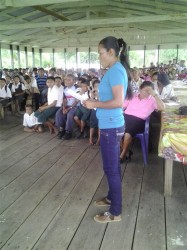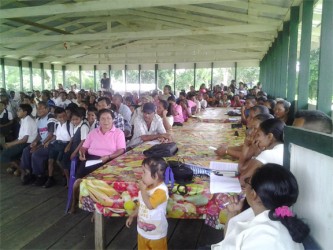In a plea for the safeguarding of their only water source, Kako villagers on Tuesday called for the immediate suspension of mining on the Kako River as well as a banning of future operations upstream from the village during a tense meeting with a government team.
The government team later reported that a working group has been formed to examine the issue in the Region Seven community—one of a number that have pitted Amerindian communities against miners recently.
“What we need here is immediate resolutions to our problems,” Toshao of Kako Mario Hastings said even as he lamented that Minister of Amerindian Affairs Pauline Sukhai and Minister of Natural Resources and the Environment (MNRE) Robert Persaud had not accepted their invitation to the meeting. In their stead, adviser to Sukhai, Yvonne Pearson and Indigenous Relations Specialist in the MNRE, Ashton Simon represented the ministers. Autry Haynes, the Chief Executive Officer of the Indigenous Peoples Commis-sion (IPC), and officials from the Guyana Geology and Mines Commission (GGMC) and the Environmental Pro-tection Agency (EPA) were also present. Stabroek News was present at the meeting.
Persaud, in a letter to Hastings and which was read to the meeting, said that it is his intention to visit the community shortly. The minister said that following a meeting with the IPC, he has directed that a working group be formed to examine the concerns of Kako. Simon chairs the working group which also includes representatives from the Amerindian Affairs ministry, the IPC, the GGMC, the EPA, the Guyana Forestry Commission and the Guyana Lands and Surveys Commission.
Simon told the villagers that a report on the issues will be compiled and he will make representation to the ministry so that they can have an in-depth look at the issues. He said that a report will be made back to the village in a month’s time.
Hastings had said that even though the village had raised their concerns with officials, it seems as though it was falling on deaf ears as they still see persons encroaching on the area of concern. Later, he said that they were not satisfied with the meeting as there was no commitment that their concerns would be immediately addressed.
Following a report, the United Nations Committee on the Elimination of Racial Discrimination has expressed concern over mining on titled land at the Cuyuni/Mazaruni communities of Kako and Isseneru and has asked government to provide information on the cases as well as to review the granting of mining permits and concessions where the prior and informed consent of the affected indigenous communities had not been obtained. The UN Committee requested that a response be provided before July 31, 2013.
In a statement to the meeting, the village council’s secretary, Beatrice Hastings said that villagers feel strongly that any mining slated to take place along the Kako River will alter their lives. “The pollution of the river is our major concern. You may have noticed from your trip here the colour of the Mazaruni River. This is why we are trying to save the Kako River, a waterway which is in its pristine state. Would you drink from the Mazaruni River, much less eat a fish from it, if there were any,” she asked.
“Why would you subject us to that? We have a deep connection to this river which is our source of fishes, one which is our only source of drinking water, whose waters we use for all purposes. If it should become like the Mazaruni River, what will happen to us? When the miners would have done working their claims, they will simply move on to new grounds. We will still be here, with nowhere to go, trapped and sentenced to suffer. What will happen to us?” she further questioned.
Dark water

Sited on the banks of the Kako River not far from where the clear, dark water empties into the yellow, sediment-filled waters of the polluted Mazaruni River, the community is adamant that no mining be allowed to commence upstream. Apart from a small stream where some of the residents get their drinking water – but which dries up during the dry season – the Kako River is the only source of drinking water for the 700 residents. It is also where villagers catch fish, bathe, wash and use to travel to their farms and out to meet the Mazaruni to go to Kamarang and other communities.
Currently there is one mining operation upriver. It was disclosed that there are 144 mining claims and concessions allocated on the Kako River and its tributaries and villagers said that there are indications that more miners are planning to begin operations upriver as the boom in gold mining roars on. A mining official declined to say how many concessions were on Kako’s titled land since he said that the GGMC maps do not indicate titled lands.
“We know that this is our last refuge,” Toshao Hastings told Stabroek News as he explained why they are pressing hard for the area to remain in its pristine state. Apart from the pollution and degradation, residents of the community fear there would be security issues, social ills, alcohol and drugs usage, disruption of traditional activities and “moral decay.”
Meantime, the village secretary told the meeting that for many years, the people of Kako have farmed, hunted and fished within the lands. “This is our life, one in which we are happy and content. These lands are part of who we are as a people and filled with stories which have been passed down from our fore-parents. This is how peaceful and content our lives were,” Beatrice said.
Shattered
However, she related, their peace was shattered when they learnt that mining was heading to Kako. “It was alarming because we were not consulted on the proposed activity before approval was granted,” she stated. She questioned what decision making Simon and his team had and said that they want more than listeners. “We want definite answers on how our problems will be resolved,” she said.
The miner currently operating upriver from the village is Belina Charlie and villagers had three times blocked the woman’s dredge from passing the village. She applied to the High Court which issued an order restraining the village council from preventing the passage of her dredge. The miner also filed contempt of court proceedings against the toshao which were later dismissed.
The village secretary said that they first received notification that Charlie was given approval to carry out medium scale river mining in July 2011 and a village council meeting unanimously objected to her request to pass through the village lands. Thereafter a letter from the GGMC was received by the Village Council on July 24, 2012. The letter stated that the agency had satisfied itself that mining would have had no harmful effects on the environment. “To date, we are unsure whether an environmental impact assessment was carried. If it was, we have not received or seen any such report,” Beatrice said, while questioning by what means the GGMC satisfied itself.
She said that they also received a letter from the Ministry of Amerindian Affairs which stated that Charlie’s operation had been approved and the village should cooperate with her. “Why should we as a people be asked to cooperate with a miner? Especially a miner who would destroy our environment and bring negative changes to our lives?” Beatrice questioned. She recounted that after receiving these letters, the council wrote a letter to the MOAA, the GGMC and others stating their objections to the mining operation on the grounds of contamination of the river, destruction of the environment and generally, their opposition to the operation. “We did not receive a reply from anyone,” she said.
She emphasized that no consultation was carried out with the community before the approval was granted. “This whole incident has left us uneasy as people. Our peaceful mind has left us. Now when we hear the sound of the motor, we wonder whether it is another pontoon heading up the river. When the horn is blown, both young and old, rush to the landing expecting the worse. Children who know of the incident are traumatized. Some people’s blood pressure has gone up. It has also led to us now becoming confrontational in wanting to defend our lands at all costs. This is effect that this incident has had on us,” the village secretary said. “This is not how we are as a people,” she added. “Can you imagine yourself in this position, constantly wondering who next will be heading to your home? Would you tolerate someone invading your home?”
Beatrice noted that the land means everything to the village. “We may see our houses here but our lands for farming, hunting and fishing are found away from here,” she said. She noted too that there are settlements farther up the river. “When one of the residents heard that Clarence De Abreu had claims in the area which he lives, he broke down in tears. He wanted to know where else he could go to live in peace having moved due to the hydro-dam threat in 1970s. These lands are our last refuge,” she declared.
Connected to their lands

“Those who claim to represent us should know how indigenous peoples are connected to their lands. Instead they act like they are clueless, thus making us have to explain how connected we are to this area. Then they tell us to negotiate not realizing that this is not what we want. That allowing one miner paves the way for others to come,” the community representative declared.
Haynes told the meeting that the IPC had received a letter from Charlie last year asking them to intervene on her behalf. He said that the commission met with her and the toshao. Haynes said that for small and medium scale mining, an Environmental Impact Assessment is not required and during the meeting with Persaud, it was suggested that an environmental planning exercise be done. He said that this would help to address the concerns of the village.
But Anderson Hastings, the former toshao said that it was wrong to have “consultations” after mining operations has already been approved and noted that they have received word that more miners are coming. “Stop these things until we work and resolve the problem,” he urged. “We don’t want any more confrontation after this, we want to live in peace,” he said.
Pearson said that her team was not there to make decisions and was there to listen. She said that the meeting is the first step in getting the concerns of the village addressed.
Not ‘alright’
An elderly man expressed security fears and rebuked Pearson for going to Norway and saying that Amerindians in Guyana are “alright” when this is not the case. “People like you really disrespecting our community,” he said. Pearson later responded that she had mentioned the Mazaruni land issue when speaking on the Amerindians.
“Kako is strongly opposing any mining activity until all these issues are resolved,” another resident said. Stephanie Kramer told the ministries’ representatives that they are supposed to be representing them but not doing so. She said that they want the minister to be a true representative of the indigenous people. “Knock she off man, knock she off,” another resident heckled in reference to Sukhai. Derrick Fredericks questioned what development for the land comes out of mining while Ronsdale Kramer said that since the confrontation with Charlie during which armed police were present, his children are frightened. “My children don’t want to go to school, they say sometimes ‘daddy they will kill you when I go to school’,” he related.
Kathleen Andrews, the headmistress of the Kako Primary School, said that immediately following the confrontation which was witnessed by many of the children, attendance dropped and there is a negative impact on the children’s academic performance despite teachers trying to reassure them “They don’t listen to us, they are more affected by what is going on,” she said. She recommended that the Amerindian Act be revised. “I don’t know why parliament is taking so long to do these kind of things,” she asserted.
Many other residents raised their concerns, sometimes in fiery tones with regards to social and environmental ills that could result from mining as well as the impact on their way of life. After a mining officer declined to disclose how many mining concessions are on Kako’s titled land, a visibly angry toshao Hastings told the team that the meeting was “a waste of time.” Some other residents were emotional after apparently coming to the conclusion that the government team could not take action. “Open your heart, open your ears and understand me,” one woman pleaded.
When asked for his advice, senior environmental officer at the GGMC, Kerion Husbands advised the residents to obey the law. Concern was raised that there was no representative of the village on the working group and Simon said that they would examine this.
“We feel like a people under threat with little hope for the protection of our rights as evidenced by the recent ruling against the Isseneru Village council. With our matter in court and with the legal system not recognizing our traditional lands, we feel like we are an Isseneru waiting to happen,” Beatrice told the meeting.
In January this year, a miner won a court battle against the Isseneru Village Council and the Guyana Geology and Mines Commis-sion (GGMC), preventing them from stopping operations on lands in the village. In a ruling in the High Court, Justice Diana Insanally made absolute nisi orders of certiorari and prohibition, first granted on December 7, 2011, based on the application of Joan Avahnelle Chang, a miner who holds claim licences on lands alleged by the GGMC to be owned by the Isseneru Village Council. It was found that Chang’s claim rights pre-dated the passage of the new Amerindian Act.
‘Clear disregard’

Beatrice also pointed out that the area is part of the lands being claimed under the Upper Mazaruni lawsuit which was brought against the government in 1998 which is still in court. “Therefore, we find issue with the granting of concessions on these lands without waiting for the outcome of the case,” she asserted.
She also said that about a month ago, the villagers held a meeting with Clarence De Abreu who reportedly has about 100 claims in the area. She said at the meeting, De Abreu claimed that he was given permission to mine.
“De Abreu had even claimed that he was advised by a “Minister” that if the villagers give him any problems, he can take them to court. This is a clear disregard for us as a people! It now seems that court action against indigenous communities is the new practice. We have already seen this happen in a number of cases,” the village secretary declared. She said that the miners have told them that they would give residents “permission slips” so that they can access the areas for their traditional activities.
The secretary said that the community is calling for the revision of the Amerindian Act to reflect the provision in Article 149 (G) of the Constitution so that their way of life will be secured to fully recognize our rights to lands, territories and resources and noted that the Mining Act (section 112) also recognizes their right to the quiet enjoyment over lands held by us. The government must honour the international treaties to which they are a signatory, she added.
The community representative also called on the IPC to fulfil its mandate to work towards the protection of the rights of indigenous peoples and said it has been silent on the cases of Kako and Isseneru. She also called on Sukhai to be “a true representative of the people,” while adding that if the minister is unable to help solve the problems without political interference, then her office is useless. “We have been a patient people but we are running out of patience. We want our issues to be resolved. We don’t want to live with the constant unease of concessions being given out without our knowledge. Even if we are informed, we reserve the right to determine what activities go on in our lands,” she said, declaring that the people of Kako are united and willing to fight to protect their lands.





